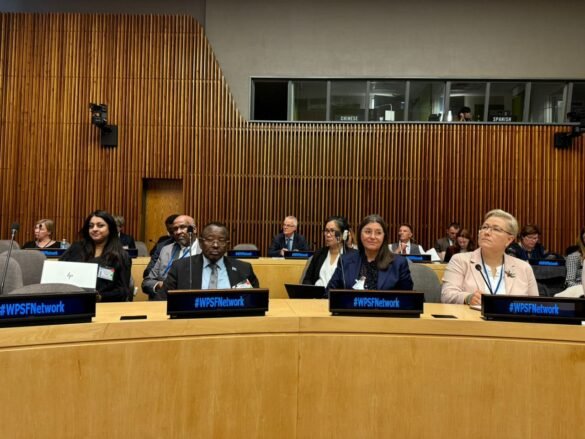The recent UN conference focused on women’s issues was disrupted after Somalia’s Family Minister, General Bashir Mohamed Jama, shared photos on social media, sparking widespread criticism. Photos posted on the platform X (formerly Twitter) by Gen. Jama showed himself and another male delegate representing Somalia at the conference, leading to public outrage and debate over the choice of male delegates at an event addressing women’s issues.
Online Backlash and Criticism from Women’s Rights Advocates
The photos from the conference, which included images of Gen. Jama alongside his adviser and former MP Abdullahi Godah Barre, received swift backlash on social media. Many users questioned the decision of the Somali government to have male representatives lead a delegation on women’s issues. Fathiya Absie, a prominent Somali author and women’s rights advocate, expressed her disapproval, stating, “It is tone-deaf for the Somali government to have men on the frontline, representing women at the conference.”
Absie and others highlighted that while women face significant challenges in Somalia, the government’s decision to appoint male delegates to such a conference underscores a broader lack of representation and sensitivity regarding gender issues. This incident has rekindled debates on Somalia’s stance on women’s rights and representation within its government.
Somalia’s Delegation Composition and the Exclusion of Female Representatives
The controversy escalated as it became known that Somalia’s delegation to the UN’s Women, Peace, and Security Focal Points Network event included two female members, Iman Elman and Sadia Mohammed Nur. Elman, a high-ranking military officer, and Nur, a civil servant, were part of Somalia’s four-member delegation but were absent from the publicly shared photos, further intensifying criticism. According to a senior civil servant from Somalia’s Ministry of Family and Human Development, 21 of the 197 delegates at the conference were men. However, the exclusion of the female delegates from the photos shared online has fueled frustration among Somali citizens and advocates.
A representative from Somalia’s Family Ministry responded to the criticism, stating that other male ministers from countries such as Japan and China were also in attendance at the conference, suggesting that Somalia was not the only nation with male representatives. However, this explanation did little to assuage the criticism, as many Somalis viewed the Somali government’s representation at the conference as reflective of broader systemic issues.
Broader Implications: Renaming of Somalia’s Women’s Ministry
The online backlash has brought renewed attention to the Somali government’s decision earlier this year to rename the Ministry of Women and Human Rights Development as the Ministry of Family and Human Rights Development. Many advocates argue that this change in name diminishes the focus on women’s specific issues and reduces their visibility in national policy discussions. Fathiya Absie and other activists contend that removing the word “women” from the ministry title effectively sidelines gender-specific issues and fails to recognize the unique challenges faced by women in Somalia.
Gen. Jama, who heads the renamed ministry, previously held roles in military and intelligence services, raising questions about the prioritization of women’s rights under his leadership. Critics argue that the renaming of the ministry reflects a trend of decreased female political influence in Somalia, particularly in a country where women have historically played critical roles in peacebuilding and leadership.
Mixed Reactions from the Public
Reactions to the incident have varied. While many are critical of the Somali government’s approach, some citizens defended the choice, suggesting that experience, not gender, should determine the suitability of a delegate to represent national interests. Supporters of Gen. Jama argue that his experience in government and his current role in the Family Ministry qualify him to represent Somalia at international events focused on development and security.
Nonetheless, voices calling for increased female representation are growing louder. Many argue that the presence of women in high-level discussions on women’s issues is essential to addressing the specific needs and challenges faced by Somali women. A senior representative from the ministry assured the public that they would work toward ensuring greater female involvement in future international forums on women’s issues.
Calls for Structural Change and Increased Female Representation
The disruption at the UN conference over women issues, following the Somalian delegate’s photos shared on social media, underscores the need for greater gender balance in the Somali government’s representation. Women’s rights advocates contend that Somalia should work to promote gender inclusivity in national and international spaces to reflect a commitment to women’s empowerment.
The broader public reaction has sparked discussions within Somali civil society on the importance of empowering women in decision-making roles. As Somalia continues to grapple with gender equality issues, this incident may lead to calls for increased government accountability and a re-evaluation of policies that could impact women’s representation and rights.
Conclusion
The recent UN conference over women issues was disrupted by the social media posts of Somalia’s Family Minister, Gen. Bashir Mohamed Jama, prompting significant backlash over the country’s representation choices. As the government defends its delegation, the incident has raised critical questions about gender equality, representation, and Somalia’s commitment to addressing women’s issues on an international stage. With advocates calling for stronger female representation, the Somali government faces mounting pressure to demonstrate a renewed dedication to gender inclusivity and the prioritization of women’s rights within its policies and global engagements.
Stay connected to know more on arcnews.online for global news like UN Conference Over Women Issues Gets Disrupted After the Somalian Delegate Shared Photos on Social Media. For videos updates visit our YouTube. Do subscribe to Arcnews to get latest updates directly in your mail box.
Have A Great Day.


